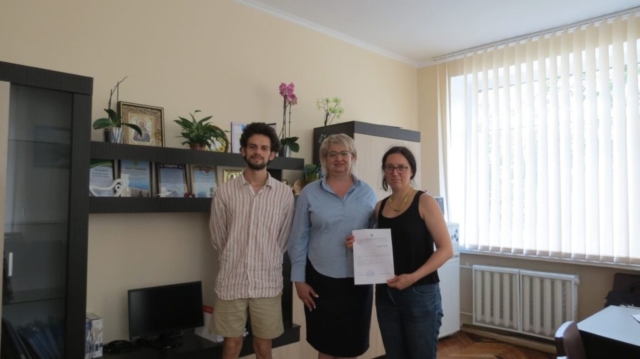Ms. Ponomarenko, what were the tasks and the types of treatments conducted in the psychiatric hospital before the full-scale invasion that started on 24 February 2022?
Since its foundation, the psychiatric hospital №2 in Vorzel has had the task of meeting the needs of the population from Kyiv and Kyiv region in terms of psychiatric treatment and care. The hospital has eight departments, the most important of which are: for children and adolescents, people with Down’s syndrome, autistic people, people with psycho-behavioural disorders and those with delays in mental development. One unit is dedicated to helping people who are addicted to alcohol.
How many people from war zones traumatised by the war are being treated in this clinic at the moment? How have these tasks changed since the beginning of the war? How many employees and volunteers work there?
Since 2017, the hospital has specialised in offering help to veterans who have suffered psychological damage from the military actions in the Donbas region. The majority of patients suffer from traumas caused by the Russian military aggression. They are soldiers who fought at the front and who could not cope with the terrible reality of war: they had to kill people or experience the death of friends without being able to prevent it. Among the patients, there are soldiers who feel forced by society to go to war, while others are spared the war at the front. Some soldiers have experienced imprisonment and torture, and others whose family members have been victims of sexual violence. Finally, there are patients who, due to their inability to cope with trauma themselves, plunge into drug and alcohol addictions. These people mainly suffer from deep depression, and anxiety and have psychosomatic complaints.
The hospital can accommodate a maximum of 300 patients and about 45 to 50 should be able to be treated as outpatients, i.e. they come during the day and spend the night at home. The hospital currently has 16 doctors, 34 nurses and 16 employees (secretaries, cooks, ambulance drivers, workers, cleaning service). Nowadays, the staff is overworked and the hospital is clearly understaffed, as it accommodates more patients than the infrastructure can provide for. When the Russian full-scale invasion started in February 2022, the hospital admitted 62 patients from the Kharkiv Psychiatric Hospital. They had to be evacuated from Kharkiv. As the Kharkiv Psychiatric Hospital has not reopened after the Russian attack on the city, all patients remain in Vorzel for the time being. For the weekend, only one psychiatrist is on duty for all 300 patients.
However, volunteers come to the hospital to offer their help. They are mostly psychology and medical students who are not allowed to take responsibility for treatment, and the opportunities for deployment are therefore limited. There was a children’s ward in the hospital until the beginning of the full-scale invasion. It is now closed.
There are no children in the hospital at the moment, as parents prefer to keep their children with the family, or they come by as outpatients.
The members of a dog club from Kyiv come regularly with their dogs to provide canistherapy for the patients.
What are the main illnesses and mental disorders of the civilian patients and the soldiers who come here from the front?
We, executive workers, are prohibited by law from publishing the exact statistical data of our patients. But it is a fact that our hospital has specialised in the treatment of war veterans since 2015.
With what expectations did these people sign up for the war? Are these hopes false given what awaits the soldiers there?
Each person’s personal story is different. Many patriots signed up for the war to defend their country. Only, the reality that awaits the soldiers at the front is much crueller than they could have imagined.
Were these men and women prepared for war?
No, in general, you can say that people were not prepared for war at all. Until the day of the Russian full-scale invasion, no one really believed that such a thing was possible. The shock among the Ukrainians was all the greater.
Does this clinic have enough trained staff to treat all the patients?
There is a lack of staff, especially staff trained in the field of war trauma. Some of the counsellors suffer from burnout themselves. There is also a lack of medicines; the government-guaranteed quotas have been reduced, although the hospital needs many more medicines during the time of war.
What do these men and women do after therapy?
The civilian patients return to civilian society after treatment. Unfortunately, the number of relapses is high. This has to do with the fact that war continues and there are loud air raid alarms almost every day. Tragic news reaches people every day. After their treatment, most soldiers return to the front.
What material and personnel challenges does the clinic face today? What is lacking above all?
Above all, there is a lack of medicines and the necessary medical and material equipment. During the Russian occupation, all computers and medical equipment were either stolen or destroyed. The heating system was severely damaged. Even ladles and cutlery from the kitchen were stolen. The medical encyclopaedias in the director’s office were burnt. Several departments of the hospital are in dire need of renovation. Many rooms where windows and doors were ripped out during the occupation have had snow and rain falling inside, so the floors are damaged and mould has grown in many places. These need to be replaced urgently. The small greenhouse where the patients grew vegetables, which is also part of the treatment, was destroyed.
Does the clinic receive aid from abroad? How much of the clinic’s needs are covered by this aid?
First, Ukrainian citizens helped after the liberation of Vorzel and the return of the inmates to the hospital. Some farmers from the region bring dairy products and food. Sports clubs from Kyiv helped to clean and, as far as possible, repair the buildings after the occupation.
A German organisation made a donation to buy medicines. These should last until the end of 2023. But the real needs have increased so rapidly that these aid packages were used up in the course of only 3 months.
When Ms. Pantaleoni asked if “Ad Pacem” could help right away with a donation for the purchase of medicines, tears came to the director’s eyes. She confessed that at the moment, in many areas, the clinic only had medicines available until the end of the current week. She gratefully accepted the offer for the immediate purchase of a €1000 aid package (to be seen on the website under the heading “Russia’s war on Ukraine”, 3 July 2023).
Mrs Tetyana Ponomarenko with Natalya Pantaleoni and our representative in Ucraine Anatoly Kmetko.


